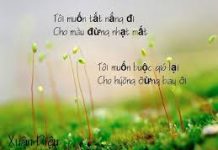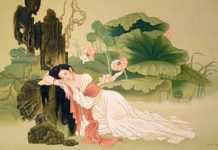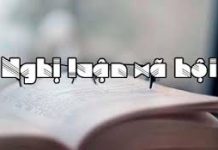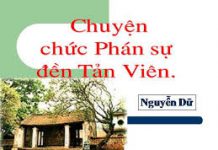Đề thi Đại học môn Tiếng Anh khối D năm 2014
Mọi ý kiến đóng góp xin gửi vào hòm thư: [email protected]
Tổng hợp các đề cương đại học hiện có của Đại Học Hàng Hải: Đề Cương VIMARU
Kéo xuống để Tải ngay đề cương bản PDF đầy đủ: Sau “mục lục” và “bản xem trước”
(Nếu là đề cương nhiều công thức nên mọi người nên tải về để xem tránh mất công thức)
Đề cương liên quan: Đề thi Đại học môn tiếng Anh
Mục Lục
Tải ngay đề cương bản PDF tại đây: Đề thi Đại học môn Tiếng Anh khối D năm 2014
Đề thi Đại học môn Tiếng Anh khối D năm 2014
ĐỀ THI GỒM 80 CÂU (TỪ QUESTION 1 ĐẾN QUESTION 80)
Mark the letter A, B, C, or D on your answer sheet to indicate the sentence that is CLOSEST in meaning to the sentence given in each of the following questions.
Question 1: “Send this urgent document immediately!” the officer told the soldier.
- The officer ordered the soldier to deliver the urgent document instantly.
- The officer advised the soldier to send the urgent document right away.
- The officer requested that the soldier rush out due to the document’s urgency.
- The officer recommended the soldier leave right away because of the urgent document.
Question 2: The president placed his car at my disposal as a bonus for my good work.
- To get rid of the car, the president decided to sell it to me, his good worker, at a bonus price.
- I was willing to drive the president’s car as a compliment for my good performance at work.
- In order to praise me as a good worker, the president took me home in his own car.
- To show his appreciation for my good work, the president allowed me to use his car whenever I liked.
Question 3: “Why don’t you join us for our next class reunion?” Mary said to me.
- Mary strongly urged me to join them for the next class reunion.
- Mary advised me not to join them for the next class reunion.
- Mary cordially invited me to join them for the next class reunion.
- Mary insisted on my joining them for the next class reunion.
Question 4: “Believe me. It’s no use reading that book,” Janet told her boyfriend.
- Janet suggested to her boyfriend that reading the book was useful.
- Janet managed to persuade her boyfriend that reading the book was worthwhile.
- Janet tried to convince her boyfriend that the book was not worth reading.
- Janet opposed her boyfriend’s idea that reading the book was not useful.
Question 5: The early failure of the Spanish squad in the 2014 World Cup deeply disappointed their fans.
- Living up to their fans’ expectation, the Spanish squad left the 2014 World Cup so early.
- The Spanish squad was terribly disappointed that their fans had to leave the 2014 World Cup so early.
- That their squad left the 2014 World Cup so early was very disappointing for the Spanish sportsmen.
- To the disappointment of their fans, the Spanish squad had to leave the 2014 World Cup too early.
Mark the letter A, B, C, or D on your answer sheet to indicate the word(s) OPPOSITE in meaning to the underlined word(s) in each of the following questions.
Question 6: We run a very tight ship here, and we expect all our employees to be at their desks by eight o’clock and take good care of their own business.
- organize things inefficiently C. manage an inflexible system
- have a good voyage
- run faster than others
Question 7: Any student who neglects his or her homework is unlikely to do well at school.
- looks for B. approves of C. puts off D. attends to
Read the following passage and mark the letter A, B, C, or D on your answer sheet to indicate the word or phrase that best fits each of the numbered blanks from 8 to 17.
Postsecondary institutions and private schools are corporations under U.S. law. They are approved to operate as non-profit, for-profit, or public corporations (8)______ education and training. Increasingly, state authorities are requiring approved educational providers to apply (9)______ and receive accreditation as a condition of final and continued approval.
As corporate entities, U.S. institutions are internally self-governing and are (10)______ to make property, facilities, equipment, and utilities transactions; make their own personnel decisions; decide whom to admit to study and to graduate; (11)______ their own funds from outside sources; enter into contracts and compete for grants; and do most of the other things that corporations do. Institutions compete (12)______ one another for students, research funding, faculty, and other benefits. Public institutions may compete within the same state or territory for budget appropriations. It is the corporate nature of institutions and the competition within the
Trang 1/6 – Mã đề 946
system that (13)_____ Americans to refer to the concept of the educational or academic marketplace – an important distinctive element of the way U.S. education is organized.
Some institutions are governed (14)______ under multi-campus arrangements. These include most local public schools (governed by school districts) and many state community college and university systems. Whether single- or multi-campus, institutional corporations (15)______ by boards of citizens, both alumni and non-alumni, who are ultimately responsible for all operations. They appoint senior (16)______, such as principals, headmasters, presidents, and deans; and approve the actions taken (17)______ their name.
| From A Diverse Educational System: Structure, standards, and challenges. InfoUSA (CD version) | ||||
| Question 8: | A. provided | B. provision | C. provide | D. providing |
| Question 9: | A. with | B. on | C. to | D. for |
| Question 10: A. able | B. capable | C. probable | D. possible | |
| Question 11: A. call | B. lend | C. raise | D. rise | |
| Question 12: A. for | B. with | C. at | D. to | |
| Question 13: A. causes | B. makes | C. prevents | D. lets | |
| Question 14: A. collect | B. collectively | C. collective | D. collection | |
| Question 15: A. controlled | B. are controlling | C. are controlled | D. being controlled | |
| Question 16: A. leaders | B. assistants | C. judges | D. trainees | |
| Question 17: A. in | B. on | C. above | D. at | |
Mark the letter A, B, C, or D on your answer sheet to indicate the underlined part that needs correction in each of the following questions.
Question 18: All of the students in this course will be assessed according to their attendance, performance,
A B C and they work hard.
D
Question 19: As seeing from the mountain top, the area looks like a picturesque harbour town.
A B C D Question 20: Most of the students are queuing in lines waiting to enter the classroom.
A B C D
Question 21: Women in many parts of the world have had lower status than men, which the extent
A B
of the gap between genders varies across cultures and times.
C D
Question 22: Since January this year, Joe has suffered two injuries, one to his ankle and the other in New York.
A B C D
Read the following passage and mark the letter A, B, C, or D on your answer sheet to indicate the correct answer to each of the questions from 23 to 32.
We live in a world of tired, sleep deprived people. In his book Counting Sheep, Paul Martin – a behavioural biologist – describes a society which is just too busy to sleep and which does not give sleeping the importance it deserves.
Modern society has invented reasons not to sleep. We are now a 24/7 society where shops and services must be available all hours. We spend longer hours at work than we used to, and more time getting to work. Mobile phones and email allow us to stay in touch round the clock and late-night TV and the Internet tempt us away from our beds. When we need more time for work or pleasure, the easy solution is to sleep less. The average adult sleeps only 6.2 hours a night during the week, whereas research shows that most people need eight or even eight and a half hours’ sleep to feel at their best. Nowadays, many people have got used to sleeping less than they need and they live in an almost permanent state of ‘sleep debt’.
Until the invention of the electric light in 1879 our daily cycle of sleep used to depend on the hours of daylight. People would get up with the sun and go to bed at nightfall. But nowadays our hours of sleep are mainly determined by our working hours (or our social life) and most people are woken up artificially by an alarm clock. During the day caffeine, the world’s most popular drug, helps to keep us awake. 75% of the world’s population habitually consume caffeine, which up to a point masks the symptoms of sleep deprivation.
What does a chronic lack of sleep do to us? As well as making us irritable and unhappy as humans, it also reduces our motivation and ability to work. This has serious implications for society in general. Doctors, for example, are often chronically sleep deprived, especially when they are on ‘night call’, and may get less than three hours’ sleep. Lack of sleep can seriously impair their mood, judgment, and ability to take decisions. Tired engineers, in the early hours of the morning, made a series of mistakes with catastrophic results. On our roads and motorways lack of sleep kills thousands of people every year. Tests show that a tired driver can be
Trang 2/6 – Mã đề 946
just as dangerous as a drunken driver. However, driving when drunk is against the law but driving when exhausted isn’t. As Paul Martin says, it is very ironic that we admire people who function on very little sleep instead of criticizing them for being irresponsible. Our world would be a much safer, happier place if everyone, whatever their job, slept eight hours a night.
New English File Upper-intermediate by Clive Oxenden and Christina Latham-Koenig, OUP
Question 23: According to the passage, which of the following statements is TRUE about Paul Martin? A. He gives an interesting account of a sleepless society.
- He is a scientist who is chronically deprived of sleep.
- He shows his concern for sleep deprivation in modern society.
- He describes the modern world as a place without insomnia.
Question 24: The phrase “round the clock” in the second paragraph is similar in meaning to ______.
- having a round clock B. all day and night C. surrounded with clocks D. during the daytime
Question 25: The writer mentions the Internet in the passage as ______.
- an easy solution to sleep deprivation B. a temptation that prevents us from sleeping
- a factor that is not related to sleep deprivation D. an ineffective means of communication
Question 26: According to the third paragraph, which of the following statements is NOT TRUE? A. The sun obviously determined our daily routines.
- The electric light was invented in the 19th century.
- The electric light has changed our daily cycle of sleep.
- Our social life has no influence on our hours of sleep.
Question 27: The word “which” in the third paragraph refers to ______.
- the world’s population B. masking the symptoms C. caffeine consumption D. reaching a point
Question 28: Which of the following is TRUE, according to the last paragraph?
- Sleep deprivation has negative effects on both individuals and society.
- Doctors ‘on night call’ do not need more than three hours of sleep a day.
- Thousands of people are killed every day by drunken drivers.
- Our motivation decreases with the bigger number of hours we sleep.
Question 29: The word “catastrophic” in the last paragraph probably means ______.
- likely to become worthless B. becoming more noticeable C. causing serious damage or loss D. bound to bring satisfaction
Question 30: Which of the following would the writer of the passage approve of?
- Both drunken drivers and sleep-deprived people should be criticized.
- We certainly can function well even when we hardly sleep.
- There is no point in criticizing irresponsible people in our society.
- Our world would be a much safer place without drinkers.
Question 31: All of the following are mentioned as those whose performance is affected by ‘sleep debt’ EXCEPT ______.
- engineers
- drivers
- biologists
- doctors
Question 32: Which of the following could best serve as the title of the passage?
- Sleep Deprivation: Causes and Effects B. Accident Prevention: Urgent!
- A Society of Sleepless People D. A Well-known Biologist
Mark the letter A, B, C, or D on your answer sheet to indicate the word(s) CLOSEST in meaning to the underlined word(s) in each of the following questions.
Question 33: Many parents may fail to recognize and respond to their children’s needs until frustration explodes into difficult or uncooperative behavior.
| A. remains at an unchanged level | B. suddenly becomes uncontrollable | |
| C. slowly reaches the boiling point | D. stays under pressure | |
Question 34: “A friend in need is a friend indeed”: Our friends have voiced their strong criticism of China’s escalation of tension on our continental shelf.
| A. facing the reality | B. easing the tension | |
| C. worsening the situation | D. improving the condition | |
Question 35: Those children who stay longer hours at school than at home tend to spend their formative years in the company of others with similar aims and interests.
| A. enjoying the care of parents | B. being together with friends | ||
| C. being separated from peers | D. forming a new business company | ||
| Trang 3/6 – Mã đề 946 | |||
Mark the letter A, B, C, or D on your answer sheet to indicate the correct answer to each of the following questions.
Question 36: Visitors to the local museum are mostly attracted by ______ rocking chair.
- a beautiful old European wooden B. an old beautiful wooden European C. a wooden old beautiful European D. an old wooden European beautiful
Question 37: Carbon dioxide ______ as one of the main contributors to the greenhouse effect.
- has been identified B. had identified C. had been identified D. has identified Question 38: In my opinion, ______ new technology who will finally decide which ideas take off.
- that the development of B. it is the user of
- that the user of D. it is the development of
Question 39: Jane had difficulty carrying her suitcase upstairs, and Mike, her friend, offered to help. Select the most suitable response to fill in the blank.
Mike: “Need a hand with your suitcase, Jane?”
Jane: “______”
- Not a chance. B. I don’t believe it.
- Well done! D. That’s very kind of you.
Question 40: Minh, a student from Hai Phong, is going to take the college entrance exam in Hanoi next week.
His father is seeing him off at the railway station. Select the most suitable response to fill in the blank.
Dad: “Good luck with the exam, Minh!”
Minh: “______, Dad.”
- Never mind
- Thank you
- I wish so
- By no means
Question 41: He applied for a teaching ______ at Bales University with great confidence. A. employment B. post C. work D. career
Question 42: “My secretary will book you an afternoon flight and have you ______ at the airport.”
- picking up B. to pick up C. picked up D. pick up
Question 43: The young lady sat still in the afternoon breeze, with her hair ______ her back.
- running over B. fallen against C. flowed down D. streaming down
Question 44: “Could you turn off the stove? The potatoes ______ for at least thirty minutes.”
- were boiling B. boiled C. are boiling D. have been boiling
Question 45: While I was looking through my old albums the other day, I ______ this photograph of my parents’ wedding.
- made up B. came across C. took after D. turned down
Question 46: In the last match, Sabella changed his formation at half-time, introducing Fernando Gago in midfield and Higuain in attack, but in the end it was Messi’s magic that ______ the difference.
- did B. gave C. took D. made
Question 47: The cinema is no longer as popular as it was in the 1930’s and 1940’s, but it is still an important ______ of entertainment.
- prospect B. origin C. status D. source
Question 48: ______ my mother’s encouragement, I wouldn’t have made such a daring decision.
- In spite B. Providing C. Until D. But for
Question 49: We’ve already bought the house but won’t ______ it until May, when the present occupants have moved out.
- keep track of
- gain recognition of
- take possession of
- catch sight of
Question 50: In no circumstances ______ on campus.
- should smoking be allowed
- we should allow smoking
- should allow smoking
- smoking should be allowed
Question 51: The bank has more than 100 branches, ______ in a major urban area.
- the location of which B. and are located C. each located D. each locating
Question 52: They got lost in the forest, and ______ made matters worse was that night began to fall.
- it B. which C. what D. that
Question 53: Students are encouraged to develop critical thinking ______ accepting opinions without questioning them.
- in addition
- because of
- instead of
- for instance
Question 54: ______, she continued to carry out her duties.
- Despite her good health B. Although in poor health
- Although she is in good health D. No matter how poor her health
Trang 4/6 – Mã đề 946
Question 55: We need to talk more about ______ for the summer vacation before July.
- where to go B. when to use C. why to choose D. how to make
Question 56: The carefully nurtured gardens with a wide ______ of flowers and fruit trees have added
elegance to this place and made it a major tourist attraction.
- number B. amount C. variety
- species
Question 57: “Take a spare tyre ______ you have a puncture on the way to the beach.”
- in case B. unless C. so that D. if
Question 58: Phuong Thao is a student in Ms Lan’s writing class. She is asking for Ms Lan’s comments on her last essay. Select the most suitable response to fill in the blank.
Phuong Thao: “You must have found reading my essay very tiring.”
Ms Lan: “______. I enjoyed it.”
- Just in case B. You are welcome
- Not in the least
- At all costs
Question 59: Jessica looks very tired. She ______ have stayed up late to finish her assignment last night.
- should B. must C. would D. will
Question 60: China’s placement of its oil rig in Vietnam’s East Sea EEZ has been denounced by ASEAN and
Western politicians and professionals as the violation of Vietnam’s ______ waters. A. territorial B. fresh C. farmed
- inland
Mark the letter A, B, C, or D on your answer sheet to indicate the sentence that best combines the pair of sentences given in each of the following questions.
Question 61: She wrote the text. She selected the illustration as well.
- The text she wrote was not as good as the illustration she selected.
- She not only wrote the text but also selected the illustration.
- If she had written the text, she would have selected the illustration.
- In order to select the illustration, she had to write the text.
Question 62: Most scientists know him well. However, very few ordinary people have heard of him.
- Not only scientists but also the general public know him as a big name.
- Although he is well known to scientists, he is little known to the general public.
- Many ordinary people know him better than most scientists do.
- He is the only scientist that is not known to the general public.
Question 63: Nam defeated the former champion in three sets. He finally won the inter-school table tennis championship.
- Having defeated the former champion in the inter-school table tennis, Nam did not hold the title of champion.
- Being defeated by the former champion, Nam lost the chance to play the final game of inter-school table tennis championship.
- Although Nam defeated the former champion in three sets, he did not win the title of inter-school table tennis champion.
- Having defeated the former champion in three sets, Nam won the inter-school table tennis championship.
Question 64: She looked through the hotel advertisements. She stopped only when taking a fancy to one piece.
- She took so great a fancy to the hotel advertisements that she could not stop reading them.
- She stopped looking through the hotel advertisements only when she had found another piece.
- She stopped reading the hotel advertisements only when one of them caught her fancy.
- She found the hotel advertisements so interesting that she could hardly turn away from them.
Question 65: I do my homework and schoolwork in separate books. I don’t get muddled up.
- I would get muddled up if I did not separate homework from schoolwork.
- I do my homework and schoolwork in separate books so that I don’t get muddled up.
- I do not get muddled up due to the separation between homework and schoolwork.
- Having two separate books at home and at work helps me avoid getting muddled up.
Read the following passage and mark the letter A, B, C, or D on your answer sheet to indicate the correct answer to each of the questions from 66 to 75.
Centuries ago, man discovered that removing moisture from food helped to preserve it, and that the easiest way to do this was to expose the food to sun and wind. In this way the North American Indians produced pemmican (dried meat ground into powder and made into cakes), the Scandinavians made stockfish and the Arabs dried dates and apricots.
All foods contain water – cabbage and other leaf vegetables contain as much as 93% water, potatoes and other root vegetables 80%, lean meat 75% and fish anything from 80% to 60% depending on how fatty it is. If this water is removed, the activity of the bacteria which cause food to go bad is checked.
Trang 5/6 – Mã đề 946
Fruit is sun-dried in Asia Minor, Greece, Spain and other Mediterranean countries, and also in California, South Africa and Australia. The methods used vary, but in general the fruit is spread out on trays in drying yards in the hot sun. In order to prevent darkening, pears, peaches and apricots are exposed to the fumes of burning sulphur before drying. Plums for making prunes, and certain varieties of grapes for making raisins and currants, are dipped in an alkaline solution in order to crack the skins of the fruit slightly and remove their wax coating, so increasing the rate of drying.
Nowadays most foods are dried mechanically; the conventional method of such dehydration is to put food in chambers through which hot air is blown at temperatures of about 110°C at entry to about 45°C at exit. This is the usual method for drying such things as vegetables, minced meat, and fish.
Liquids such as milk, coffee, tea, soups and eggs may be dried by pouring them over a heated horizontal steel cylinder or by spraying them into a chamber through which a current of hot air passes. In the first case, the dried material is scraped off the roller as a thin film which is then broken up into small, though still relatively coarse flakes. In the second process it falls to the bottom of the chamber as a fine powder. Where recognizable pieces of meat and vegetables are required, as in soup, the ingredients are dried separately and then mixed.
Dried foods take up less room and weigh less than the same food packed in cans or frozen, and they do not need to be stored in special conditions. For these reasons they are invaluable to climbers, explorers and soldiers in battle, who have little storage space. They are also popular with housewives because it takes so little time to cook them.
From Practical Faster Reading by Gerald Mosback and Vivien Mosback. CUP
Question 66: What is the main idea of the passage? A. Different methods of drying foods.
- Mechanization of drying foods.
- Advantages of dried foods.
- Water: the main component of food.
Question 67: The phrase “do this” in the first paragraph mostly means ______.
- remove moisture from foods B. produce pemmican
- expose foods to sun and wind D. moisten foods
Question 68: The word “checked” in the second paragraph is closest in meaning to ______.
- examined carefully B. put a tick C. motivated to develop D. reduced considerably
Question 69: In the process of drying certain kinds of fruits, sulphur fumes help ______.
- maintain their color B. remove their wax coating
- crack their skin D. kill off bacteria
Question 70: Nowadays the common method for drying vegetables and minced meat is ______. A. dipping them in an alkaline solution
- putting them in chambers and blowing hot air through C. pouring them over a heated horizontal steel cylinder D. spreading them out on trays in drying yards
Question 71: What does the word “which” in the fourth paragraph refer to?
- Vegetables B. Foods C. Things D. Chambers
Question 72: The final product of the process of drying liquids that uses the first method will be ______.
- recognizable pieces B. dried soup C. fine powder D. small flakes
Question 73: Which of the following is NOT mentioned in the passage?
- People in India began to use drying methods centuries ago.
- Fruit is usually dried by being laid out on trays in the sun.
- Liquids are not dried in the same way as fruits and vegetables.
- Dried foods have several advantages over canned or frozen foods.
Question 74: According to the passage, dried foods are most useful for ______.
- people who are on the move B. soldiers who are not in battle
- explorers who are underweight D. housewives who have little storage space
Question 75: This passage is mainly ______.
- argumentative B. analytical C. informative D. fictional
Mark the letter A, B, C, or D on your answer sheet to indicate the word that differs from the other three in the position of the primary stress in each of the following questions.
| Question 76: A. edition | B. advantage | C. enrichment | D. sovereignty |
| Question 77: A. economic | B. continental | C. considerate | D. territorial |
| Question 78: A. commit | B. preview | C. index | D. open |
| Question 79: A. fertilize | B. illustrate | C. interact | D. specify |
| Question 80: A. habitat | B. wilderness | C. candidate | D. attendance |
———- THE END ———-
Trang 6/6 – Mã đề 946











